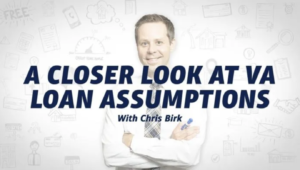
If you’re following today’s housing market, you know two of the top issues consumers face are inflation and mortgage rates. Let’s take a look at each one.
Blessings Realty | Colorado Springs and Monument Realtor
Changing minds about Realtors

Assuming another’s VA loan is an intriguing benefit with VA loans. Here we take a look at what an assumption is, the process and who can assume a VA loan.
Assuming a VA loan is a lending process where a borrower takes over or “assumes” a Veteran’s current home loan. VA loan assumptions transfer the existing loan’s balance, the interest rate and the monthly mortgage payments. The assuming party does not have to be a Veteran.

As a homebuyer, it’s important to plan and budget for the expenses you’ll encounter when you purchase a home. While most people understand the need to save for a down payment, a recent survey found 41% of homebuyers were surprised by their closing costs. Here’s some information to help you get started so you’re not caught off guard when it’s time to close on your home.
One possible reason some people are surprised by closing costs may be because they don’t know what they are or what they cover. According to U.S. News and World Report:
Closing costs encompass a variety of expenses above your property’s purchase price. They include things like lender fees, title insurance, government processing fees, upfront tax payments and homeowners insurance.
In other words, your closing costs are a collection of fees and payments made to a variety of individuals and organizations who are involved with your transaction. According to Freddie Mac, while they can vary by location and situation, closing costs typically include:
Understanding what closing costs include is important, but knowing what you’ll need to budget to cover them is critical to achieving your homebuying goals. According to the Freddie Mac article mentioned above,the costs to close are typically between 2% and 5% of the total purchase price of your home. With that in mind, here’s how you can get an idea of what you’ll need to cover your closing costs.
Let’s say you find a home you want to purchase for the median price of $350,300. Based on the 2-5% Freddie Mac estimate, your closing fees could be between roughly $7,000 and $17,500.
Keep in mind, if you’re in the market for a home above or below this price range, your closing costs will be higher or lower.
Freddie Mac provides great advice for homebuyers, saying:
As you start your homebuying journey, take the time to get a sense of all costs involved – from your down payment to closing costs.
The best way to understand what you’ll need at the closing table is to work with a team of trusted real estate professionals. An agent can help connect you with a lender, and together we can provide you with answers to the questions you might have.
In today’s real estate market, it’s more important than ever to make sure your budget includes any fees and payments due at closing. Work with us to be sure you have the knowledge you need to be confident going into the homebuying process.
Article source: https://www.keepingcurrentmatters.com/2022/03/15/dont-get-caught-off-guard-by-closing-costs/.
We perform top notch sales and marketing services for residential homes and land. We help home buyers find the right homes for their needs. Also specializing in new construction and rental properties. Whether you are a first-time home buyer or seller or have bought and sold many homes before, we will Read More…
Welcome and thank you for visiting our Blessings Realty website! We are Monument-based real estate experts providing information about the Monument and Northern Colorado Springs, CO real estate market.
While you’re here, please check out 80132 homes for sale in Monument, CO, as well as other real estate listings around the area. View listings, photos, market data, and use our detailed real estate filters to find the perfect place.
Please contact us today at (719) 425-8929 to buy or sell real estate in Colorado Springs and Monument, Colorado – or for help with your property management and probate real estate needs – we would love to speak with you!
Sincerely,
Claire and Jeff Garlick of Blessings Realty